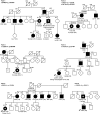POLE and POLD1 mutations in 529 kindred with familial colorectal cancer and/or polyposis: review of reported cases and recommendations for genetic testing and surveillance
- PMID: 26133394
- PMCID: PMC4823640
- DOI: 10.1038/gim.2015.75
POLE and POLD1 mutations in 529 kindred with familial colorectal cancer and/or polyposis: review of reported cases and recommendations for genetic testing and surveillance
Abstract
Purpose: Germ-line mutations in the exonuclease domains of POLE and POLD1 have been recently associated with polyposis and colorectal cancer (CRC) predisposition. Here, we aimed to gain a better understanding of the phenotypic characteristics of this syndrome to establish specific criteria for POLE and POLD1 mutation screening and to help define the clinical management of mutation carriers.
Methods: The exonuclease domains of POLE and POLD1 were studied in 529 kindred, 441 with familial nonpolyposis CRC and 88 with polyposis, by using pooled DNA amplification and massively parallel sequencing.
Results: Seven novel or rare genetic variants were identified. In addition to the POLE p.L424V recurrent mutation in a patient with polyposis, CRC and oligodendroglioma, six novel or rare POLD1 variants (four of them, p.D316H, p.D316G, p.R409W, and p.L474P, with strong evidence for pathogenicity) were identified in nonpolyposis CRC families. Phenotypic data from these and previously reported POLE/POLD1 carriers point to an associated phenotype characterized by attenuated or oligo-adenomatous colorectal polyposis, CRC, and probably brain tumors. In addition, POLD1 mutations predispose to endometrial and breast tumors.
Conclusion: Our results widen the phenotypic spectrum of the POLE/POLD1-associated syndrome and identify novel pathogenic variants. We propose guidelines for genetic testing and surveillance recommendations.Genet Med 18 4, 325-332.
Figures

References
-
- Valle L, Hernández-Illán E, Bellido F, et al. New insights into POLE and POLD1 germline mutations in familial colorectal cancer and polyposis. Hum Mol Genet 2014;23:3506–3512. - PubMed
-
- Spier I, Holzapfel S, Altmüller J, et al. Frequency and phenotypic spectrum of germline mutations in POLE and seven other polymerase genes in 266 patients with colorectal adenomas and carcinomas. Int J Cancer; 2015; 15;137(2):320–31. - PubMed
Publication types
MeSH terms
Substances
LinkOut - more resources
Full Text Sources
Other Literature Sources
Medical
Molecular Biology Databases

